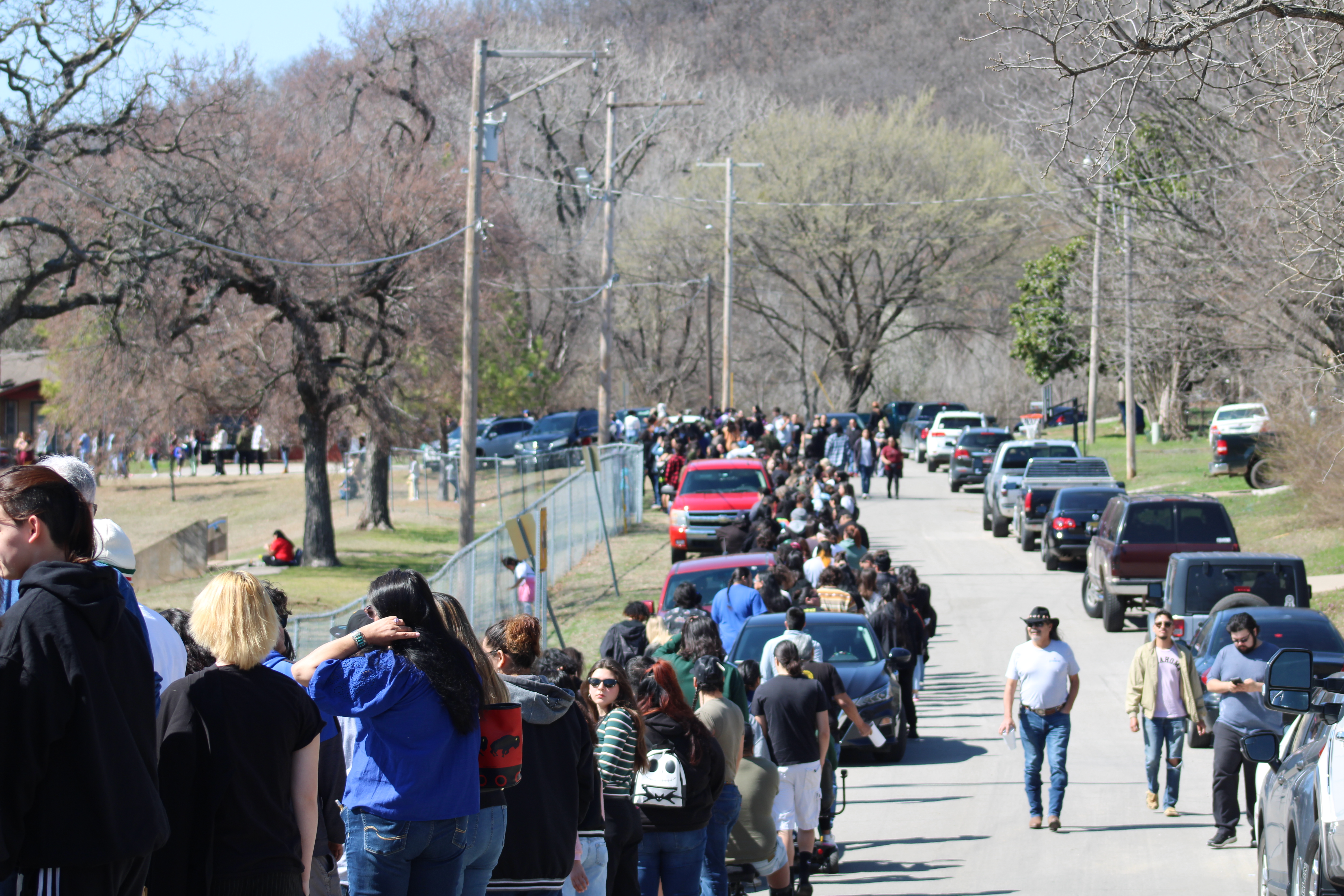
- Details
- By Darren Thompson
TULSA, Okla.—An open casting call for the upcoming season of “Reservation Dogs” brought thousands of Indigenous people to audition at the Park Elementary School in Tulsa, Oklahoma on Saturday.
The production hasn’t had an open casting call since the first season, where it found several Indigenous talents who had no previous acting experience prior to Reservation Dogs.
Distance didn’t deter many as people traveled from all over Indian Country to audition for a role. Vehicle license plates were from many Tribes in Oklahoma, but also out of state such as Minnesota, North Dakota, Texas, and New Mexico. Entire families reported to Native News Online that they made an event out of the opportunity to audition.
“This is my first time casting,” said Claudia Little-Axe, Seneca Cayuga from Miami, Oklah., to Native News Online. “I feel really good about this and I brought my children and my niece along for the experience.”
Lines to audition spanned more than four city blocks around Park Elementary School, located in a residential neighborhood in Tulsa. Food vendors were selling meat pies — a dish unique to the state — and Girl Scout cookies. As well, a food truck was set up for operation near the entrance of the school.
The production for the show was unable to share details about the upcoming season but did share how surprised they were at the amount of people who showed up for the casting call. Previous casting calls were held in Montana, Oklahoma, and Canada, where three of the main actors on the show are from. “Cheese,” who is one of the main characters, is played by Lane Factor, who didn’t have previous acting experience said one of the producers.
Nanette Harjo — mother of the hit show’s director and writer — Sterlin Harjo, said she was thrilled at the turnout.
“I think seeing the crowd is really exciting and I didn’t expect to see this many people,” said Nanette Harjo to Native News Online. “I’m really proud of my son, and this amazing show gets another season for our Indigenous writers and directors.”
It’s been one heck of a ride and everyone is supporting the show in Tulsa. We feel like we have the whole community behind us.”
Reservation Dogs is the first television show to be filmed entirely in Oklahoma and the first to feature all Indigenous writers and directors. All of the show’s main characters are Indigenous. In its first two seasons, the show has been recognized by critics and award programs for outstanding achievements including a Peabody Award, two Independent Spirit Awards, and nominations for the Critics’ Choice Television Awards and the Golden Globes.
The production said that they needed multiple positions filled from children at least 8 years old to adults.
More Stories Like This
Chickasaw Holiday Art Market Returns to Sulphur on Dec. 6Center for Native Futures Hosts Third Mound Summit on Contemporary Native Arts
Filmmakers Defend ‘You’re No Indian’ After Demand to Halt Screenings
A Native American Heritage Month Playlist You Can Listen to All Year Long
11 Native Actors You Should Know
Help us defend tribal sovereignty.
At Native News Online, our mission is rooted in telling the stories that strengthen sovereignty and uplift Indigenous voices — not just at year’s end, but every single day.
Because of your generosity last year, we were able to keep our reporters on the ground in tribal communities, at national gatherings and in the halls of Congress — covering the issues that matter most to Indian Country: sovereignty, culture, education, health and economic opportunity.
That support sustained us through a tough year in 2025. Now, as we look to the year ahead, we need your help right now to ensure warrior journalism remains strong — reporting that defends tribal sovereignty, amplifies Native truth, and holds power accountable.
 The stakes couldn't be higher. Your support keeps Native voices heard, Native stories told and Native sovereignty defended.
The stakes couldn't be higher. Your support keeps Native voices heard, Native stories told and Native sovereignty defended.
Stand with Warrior Journalism today.
Levi Rickert (Potawatomi), Editor & Publisher

